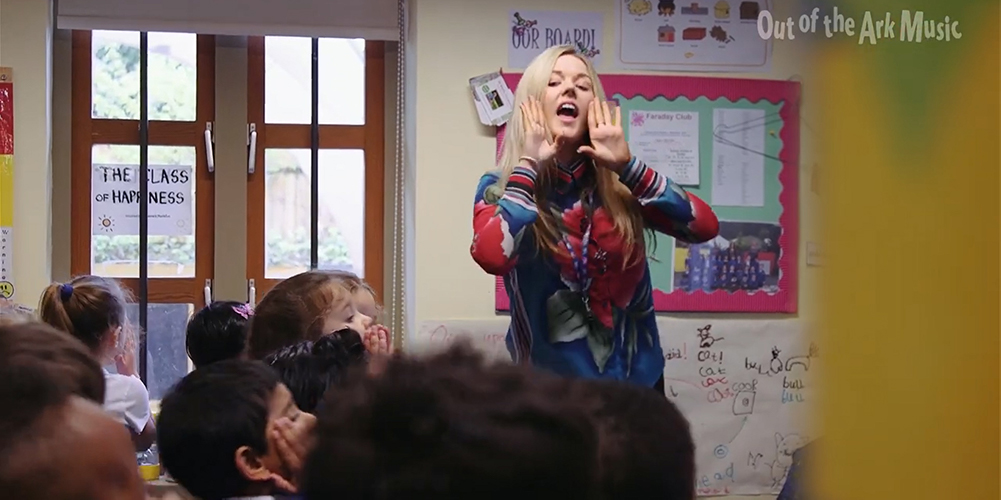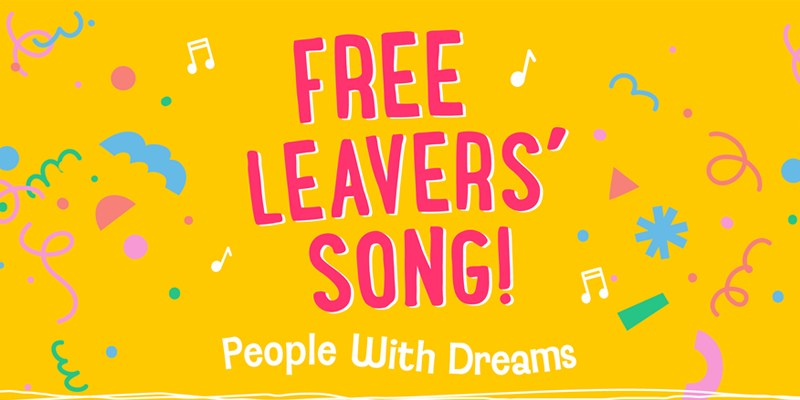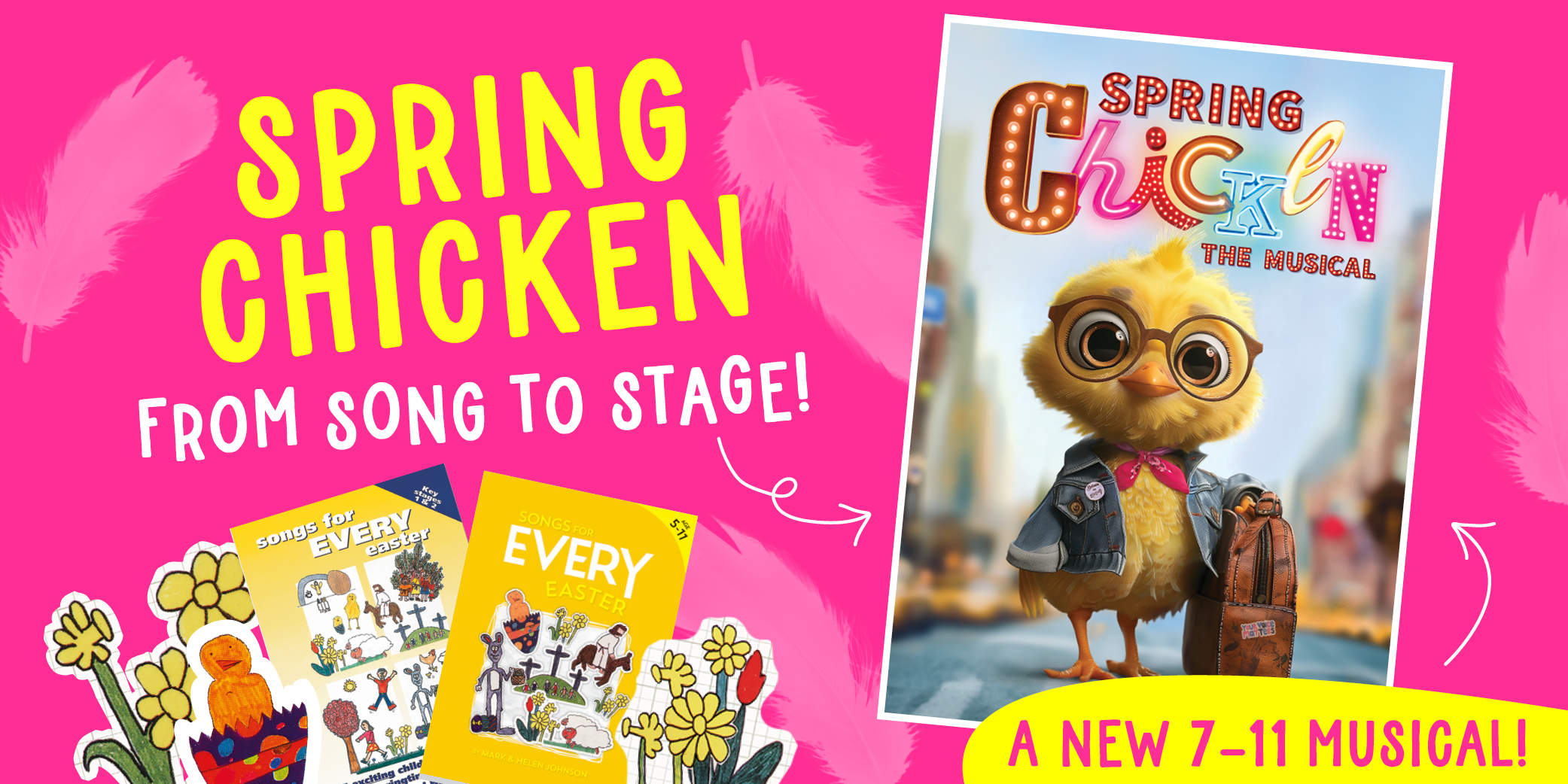
Schools that value and prioritise music have a School Music Education Plan that ensures that they are delivering a Music Curriculum in which pupils have the opportunity to learn to play an instrument, sing regularly, to perform and hear live music, and to work with professional musicians.
A school Music Champion is quite literally instrumental in making music happen across the curriculum but this isn’t a ‘one-man-band’. Every member of staff can get involved in music-making, especially when it comes to promoting a singing culture.
One of the key recommendations of Music Education: State of the Nation from the All-Party Parliamentary Group for Music Education is:
“The Government should encourage all schools to embed a culture of singing via classroom teaching.”
That’s a priority.
Singing costs nothing, it’s easy to set in motion and it oxygenates a school like nothing else. If a school ain’t singing, then it ain’t swinging so here are ten good reasons why singing should be ringing in every classroom.
1. Singing increases the happiness quotient
Singing is a ‘salutogenic’ activity, that is, one that supports health and wellbeing (Batt-Rawden and Andersen, 2019).
It’s inspiring, gives everyone a boost and puts us in a happy mood so it is great for our mindset and outlook. Singing releases endorphins and mobilises positive feelings so it’s also good for the soul of the class. Try singing Pharrell Williams' Happy and see the transformative effect an upbeat song can have!
William James once said, “I don’t sing because I’m happy. I’m happy because I sing” so if you want to increase the happiness index in your class, sing, it’s spiritually uplifting.
2. Singing is inclusive
Singing involves every child and so brings everyone together. It has the power to break down barriers because it naturally invites participation and interaction. For children with particular special needs, singing can pose a huge challenge but they can still be part of the singing experience and enjoy an active role. One research study showed that singing improves the perceptive skills of hearing-impaired children.
Singing can bring children from different backgrounds and communities together, breaking down social and ethnic barriers. It can engage those with challenging circumstances, to nurture ambition, develop self-worth, overcome disadvantage and fulfil their potential.
3. Singing bonds
Singing is a social glue. It creates a feeling of family and nurtures a sense of care, respect and empathy towards others. It can help children feel wanted and part of something special, enhance their identity and increase their self-confidence and self-esteem.
When children sing together, especially as part of a choir, they create tighter bonds with each other and are more connected as people as it promotes “co-pathy” – the social function of empathy (Koelsch, 2013).
4. Singing builds character
Singing equips children with key skills, habits and attributes for life such as concentration, discipline, time management, commitment, accuracy, staying positive and aiming high, leadership, creativity, listening and performing, self-assurance and an ability to handle competing pressures.
Singing helps unlock confidence and gives children the skills, gumption, experience and aspirations to succeed.
5. Singing fosters teamwork
Singing can promote supportive behaviours, “intentional communication” (Rabinowitch and Meltzoff, 2017) and inter-individual trust between children.
Research by Good and Russo (2016) showed that group singing influences social behaviour in positive ways. They studied the interactions of a diverse group of children from different ethnic and socio-economic backgrounds and found that compared to taking part in group art or competitive games, singing together fostered an increase in cooperative behaviours and a sense of “we-ness”.
6. Singing improves literacy
A singing rich curriculum can play a huge role in developing pupils’ language acquisition and development so that they can access the entire curriculum successfully.
Singing can inspire children to write their own songs and it gives teachers glorious opportunities to teach the 7Cs of songwriting:
i) Concept - can you summarise your song in one sentence? What is its ‘big idea’?
ii) Clever – is your idea fresh and does it have that ‘aha!’ moment?
iii) Clear – is every line easily understandable?
iv) Concise – are your lines non-wordy and is there enough space for breath and to hear each syllable?
v) Catchy – are the lyrics and melody infectious and memorable?
vi) Consistent – do all the lines in the hook relay the same message?
vii) Conversational – does your song feel personal?
Singing gives children the chance to play with words, consider the elements of a song and become storytellers. It introduces children to the sounds and meanings of a wide range of words and helps strengthen memory skills.
7. Singing is great for transitions
Sometimes moving from one activity to another needs a burst of fresh air and a brain break so that everyone can recharge and clear their headspace for something new. Singing is a great way to press ‘reset’ and gives everyone the chance to let off some steam, let the brain breathe and revitalise.
If there are challenging and restless moments in class that need to be addressed then singing can be a way to dampen and divert, change routine and to create a new focus and new perspective.
8. Singing promotes diversity
Singing promotes cultural diversity and allows children to experience genres, rhythms and ‘flavours’ of music from across the planet which expands their world view and how they perceive others (llari et al, 2013).
Singing multicultural songs and in different languages allows children to express their own identities and who they are as well as sharing in the rich heritage of others. Singing builds repertoire, expands horizons and gives children the opportunities to explore their own roots, routines, rituals and traditions.
9. Singing promotes creativity
Singing and listening to music helps children experiment, take risks and be creative. They can learn to manipulate their voices and make new sounds, they can explore styles of singing and test different ways of communicating. They can combine activities and sing along to different tasks as well as develop original thinking by creating their own songs about what they are doing. They can co-create with their friends and explore music through singing games, play and movement.
10. Singing teaches self-care
Singing is a great exercise for teaching children how to look after their voices and improve their vocal technique. It allows children to explore posture, air control, deep breathing, understand vocal registers, know when to switch between registers, staying hydrated and not eating salty foods.
And finally…. Ofsted
Singing is the most pervasive and accessible form of music and so we should be milking multiple opportunities to integrate vocal music-making into our classrooms every day. It provides opportunities for self-expression and is a source of joy, comfort and emotional sensation.
Ofsted’s new Education Inspection Framework (EIF) is great news for singing because there is now a refreshed focus on providing a broad and balanced curriculum. Singing plays its part in growing linguistic and cultural capital and it is an essential component of a truly rich curriculum. The new EIF has practically made singing a must-have for every primary classroom as the quality of music education schools provide could affect their Ofsted rating.
Out of the Ark Music have worked closely with British Sign Language (BSL) specialists, teachers, deaf and hearing adults and children to produce a number of instructional signing videos. Find out more here.
Our award-winning My World Series and Class Assembly Series are ideal resources to support and reinforce learning about curriculum-based topics in the classroom and assemblies.
A school Music Champion is quite literally instrumental in making music happen across the curriculum but this isn’t a ‘one-man-band’. Every member of staff can get involved in music-making, especially when it comes to promoting a singing culture.
One of the key recommendations of Music Education: State of the Nation from the All-Party Parliamentary Group for Music Education is:
“The Government should encourage all schools to embed a culture of singing via classroom teaching.”
That’s a priority.
Singing costs nothing, it’s easy to set in motion and it oxygenates a school like nothing else. If a school ain’t singing, then it ain’t swinging so here are ten good reasons why singing should be ringing in every classroom.
1. Singing increases the happiness quotient
Singing is a ‘salutogenic’ activity, that is, one that supports health and wellbeing (Batt-Rawden and Andersen, 2019).
It’s inspiring, gives everyone a boost and puts us in a happy mood so it is great for our mindset and outlook. Singing releases endorphins and mobilises positive feelings so it’s also good for the soul of the class. Try singing Pharrell Williams' Happy and see the transformative effect an upbeat song can have!
William James once said, “I don’t sing because I’m happy. I’m happy because I sing” so if you want to increase the happiness index in your class, sing, it’s spiritually uplifting.
2. Singing is inclusive
Singing involves every child and so brings everyone together. It has the power to break down barriers because it naturally invites participation and interaction. For children with particular special needs, singing can pose a huge challenge but they can still be part of the singing experience and enjoy an active role. One research study showed that singing improves the perceptive skills of hearing-impaired children.
Singing can bring children from different backgrounds and communities together, breaking down social and ethnic barriers. It can engage those with challenging circumstances, to nurture ambition, develop self-worth, overcome disadvantage and fulfil their potential.
3. Singing bonds
Singing is a social glue. It creates a feeling of family and nurtures a sense of care, respect and empathy towards others. It can help children feel wanted and part of something special, enhance their identity and increase their self-confidence and self-esteem.
When children sing together, especially as part of a choir, they create tighter bonds with each other and are more connected as people as it promotes “co-pathy” – the social function of empathy (Koelsch, 2013).
4. Singing builds character
Singing equips children with key skills, habits and attributes for life such as concentration, discipline, time management, commitment, accuracy, staying positive and aiming high, leadership, creativity, listening and performing, self-assurance and an ability to handle competing pressures.
Singing helps unlock confidence and gives children the skills, gumption, experience and aspirations to succeed.
5. Singing fosters teamwork
Singing can promote supportive behaviours, “intentional communication” (Rabinowitch and Meltzoff, 2017) and inter-individual trust between children.
Research by Good and Russo (2016) showed that group singing influences social behaviour in positive ways. They studied the interactions of a diverse group of children from different ethnic and socio-economic backgrounds and found that compared to taking part in group art or competitive games, singing together fostered an increase in cooperative behaviours and a sense of “we-ness”.
6. Singing improves literacy
A singing rich curriculum can play a huge role in developing pupils’ language acquisition and development so that they can access the entire curriculum successfully.
Singing can inspire children to write their own songs and it gives teachers glorious opportunities to teach the 7Cs of songwriting:
i) Concept - can you summarise your song in one sentence? What is its ‘big idea’?
ii) Clever – is your idea fresh and does it have that ‘aha!’ moment?
iii) Clear – is every line easily understandable?
iv) Concise – are your lines non-wordy and is there enough space for breath and to hear each syllable?
v) Catchy – are the lyrics and melody infectious and memorable?
vi) Consistent – do all the lines in the hook relay the same message?
vii) Conversational – does your song feel personal?
Singing gives children the chance to play with words, consider the elements of a song and become storytellers. It introduces children to the sounds and meanings of a wide range of words and helps strengthen memory skills.
7. Singing is great for transitions
Sometimes moving from one activity to another needs a burst of fresh air and a brain break so that everyone can recharge and clear their headspace for something new. Singing is a great way to press ‘reset’ and gives everyone the chance to let off some steam, let the brain breathe and revitalise.
If there are challenging and restless moments in class that need to be addressed then singing can be a way to dampen and divert, change routine and to create a new focus and new perspective.
8. Singing promotes diversity
Singing promotes cultural diversity and allows children to experience genres, rhythms and ‘flavours’ of music from across the planet which expands their world view and how they perceive others (llari et al, 2013).
Singing multicultural songs and in different languages allows children to express their own identities and who they are as well as sharing in the rich heritage of others. Singing builds repertoire, expands horizons and gives children the opportunities to explore their own roots, routines, rituals and traditions.
9. Singing promotes creativity
Singing and listening to music helps children experiment, take risks and be creative. They can learn to manipulate their voices and make new sounds, they can explore styles of singing and test different ways of communicating. They can combine activities and sing along to different tasks as well as develop original thinking by creating their own songs about what they are doing. They can co-create with their friends and explore music through singing games, play and movement.
10. Singing teaches self-care
Singing is a great exercise for teaching children how to look after their voices and improve their vocal technique. It allows children to explore posture, air control, deep breathing, understand vocal registers, know when to switch between registers, staying hydrated and not eating salty foods.
And finally…. Ofsted
Singing is the most pervasive and accessible form of music and so we should be milking multiple opportunities to integrate vocal music-making into our classrooms every day. It provides opportunities for self-expression and is a source of joy, comfort and emotional sensation.
Ofsted’s new Education Inspection Framework (EIF) is great news for singing because there is now a refreshed focus on providing a broad and balanced curriculum. Singing plays its part in growing linguistic and cultural capital and it is an essential component of a truly rich curriculum. The new EIF has practically made singing a must-have for every primary classroom as the quality of music education schools provide could affect their Ofsted rating.
Out of the Ark Music have worked closely with British Sign Language (BSL) specialists, teachers, deaf and hearing adults and children to produce a number of instructional signing videos. Find out more here.
Our award-winning My World Series and Class Assembly Series are ideal resources to support and reinforce learning about curriculum-based topics in the classroom and assemblies.
About John Dabell

John trained as a primary school teacher 25 years ago, starting his career in London and then he taught in a range of schools in the Midlands. In between teaching jobs, John worked as an Ofsted inspector, national in-service provider, project manager, writer and editor. He also worked for 6 years with Nottinghamshire Police. John now works as a writer, editor and resource reviewer.
Click here to post a comment.




